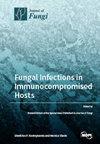MaAzaR Influences Virulence of Metarhizium acridum against Locusta migratoria manilensis by Affecting Cuticle Penetration
IF 4.2
2区 生物学
Q2 MICROBIOLOGY
引用次数: 0
Abstract
The entomopathogenic fungus (EPF) Metarhizium acridum is a typical filamentous fungus and has been used to control migratory locusts (Locusta migratoria manilensis). This study examines the impact of the Zn(II)2Cys6 transcription factor, MaAzaR, in the virulence of M. acridum. Disruption of MaAzaR (ΔMaAzaR) diminished the fungus’s ability to penetrate the insect cuticle, thereby decreasing its virulence. The median lethal time (LT50) for the ΔMaAzaR strain increased by approximately 1.5 d compared to the wild-type (WT) strain when topically inoculated, simulating natural infection conditions. ΔMaAzaR compromises the formation, turgor pressure, and secretion of extracellular hydrolytic enzymes in appressoria. However, the growth ability of ΔMaAzaR within the hemolymph is not impaired; in fact, it grows better than the WT strain. Moreover, RNA-sequencing (RNA-Seq) analysis of ΔMaAzaR and WT strains grown for 20 h on locust hindwings revealed 87 upregulated and 37 downregulated differentially expressed genes (DEGs) in the mutant strain. Pathogen–host interaction database (PHI) analysis showed that about 40% of the total DEGs were associated with virulence, suggesting that MaAzaR is a crucial transcription factor that directly regulates the expression of downstream genes. This study identifies a new transcription factor involved in EPF cuticle penetration, providing theoretical support and genetic resources for the developing highly virulent strains.MaAzaR 通过影响角质层穿透力来影响尖吻镰刀菌对蝗虫的毒力
昆虫病原真菌(EPF)Metarhizium acridum 是一种典型的丝状真菌,曾被用于控制迁徙蝗虫(Locusta migratoria manilensis)。本研究探讨了Zn(II)2Cys6转录因子MaAzaR对梭菌毒力的影响。破坏 MaAzaR(ΔMaAzaR)会降低真菌穿透昆虫角质层的能力,从而降低其毒力。在模拟自然感染条件下进行局部接种时,ΔMaAzaR菌株的中位致死时间(LT50)比野生型(WT)菌株增加了约1.5 d。ΔMaAzaR损害了贴梗的形成、张力压力和细胞外水解酶的分泌。然而,ΔMaAzaR 在血淋巴中的生长能力并未受到影响;事实上,它比 WT 菌株生长得更好。此外,对在蝗虫后翅上生长了20小时的ΔMaAzaR和WT菌株进行的RNA测序(RNA-Seq)分析显示,突变菌株中有87个基因上调,37个基因下调。病原体-宿主相互作用数据库(PHI)分析表明,DEGs总数中约有40%与毒力有关,这表明MaAzaR是一个直接调控下游基因表达的关键转录因子。这项研究发现了一种参与 EPF 角质层穿透的新转录因子,为开发高毒力菌株提供了理论支持和遗传资源。
本文章由计算机程序翻译,如有差异,请以英文原文为准。
求助全文
约1分钟内获得全文
求助全文
来源期刊

Journal of Fungi
Medicine-Microbiology (medical)
CiteScore
6.70
自引率
14.90%
发文量
1151
审稿时长
11 weeks
期刊介绍:
Journal of Fungi (ISSN 2309-608X) is an international, peer-reviewed scientific open access journal that provides an advanced forum for studies related to pathogenic fungi, fungal biology, and all other aspects of fungal research. The journal publishes reviews, regular research papers, and communications in quarterly issues. Our aim is to encourage scientists to publish their experimental and theoretical results in as much detail as possible. Therefore, there is no restriction on paper length. Full experimental details must be provided so that the results can be reproduced.
文献相关原料
| 公司名称 | 产品信息 | 采购帮参考价格 |
|---|
 求助内容:
求助内容: 应助结果提醒方式:
应助结果提醒方式:


